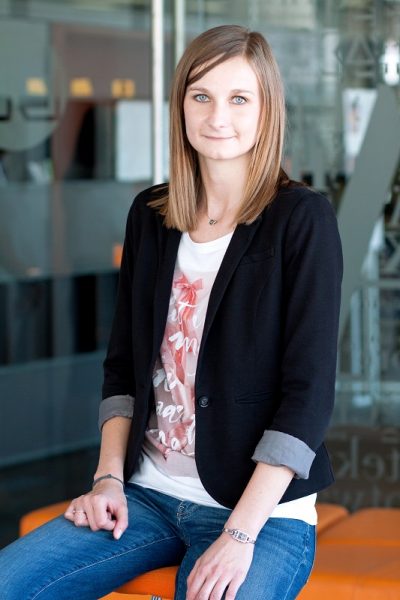RESEARCH EXCELLENCE INITIATIVE
FREEDOM OF RESEARCH – SCIENCE FOR THE FUTURE
„Freedom of research – science for the future” series consists of articles, interviews and short videos presenting research conducted by winners of „Freedom of research” call for proposals
Natalia Stępień-Lampa, PhD
Quality of students’ life after one year of pandemic
| Olimpia Orządała |
What is the quality of students’ life after one year of pandemic? Does the fear of COVID-19 have a big impact on it? What is the relationship between self-evaluation and the quality of life? These are the questions which Natalia Stępień-Lampa, PhD from the Institute of Political Science of the University of Silesia in Katowice, winner of the “Freedom of research” call for proposals organised under the Research Excellence Initiative, tried to address.

In March 2021, the interdisciplinary team of scientists operating at the Faculty of Social Sciences of the University of Silesia conducted research concerning the quality life of Polish students after one year of pandemic. The survey was completed by 1,000 respondents from public and private universities from across Poland. Natalia Stępień-Lampa, PhD together with Elżbieta Turska, Associate Professor from the Institute of Psychology of the University of Silesia used their results to determine the predictors [1] of the quality of life of young people after one year of pandemic.
‘One of the predictors was CSEs (Core Self-Evaluation) index. We used the scale interpreted by Radosław Walczak and Romuald Derbis as the research tool,’ explains the winner of the call for proposals.
The second predictor adopted for the research was social support. In order to determine it, the international MSPSS (The Multidimensional Scale of Perceived Social Support) was applied and interpreted by two Polish researchers: Krystyna Buszman from the Institute of Psychology and Prof. Hanna Przybyła-Basista, a former employee of the same institute until recently.
The last predictor was the fear of COVID-19. The FCV-19S (Fear of COVID-19 Scale) was used in adaptation made by Irena Pilch, PhD, Assoc. Prof. and Agnieszka Turska-Kawa, PhD, Assoc. Prof. from the Institute of Political Science of the University of Silesia.
‘Apart from predictors, the quality of life itself also had to be diagnosed,’ explains Natalia Stępień-Lampa, PhD. For this purpose, a universally available scale recognised by World Health Organisation, i.e. Quality of Life (WHOQOL) scale was employed.
The application of four different scales allowed to develop an original survey, thanks to which it was possible to determine the predictors of the quality of students’ life.
‘The research demonstrated the higher core self-evaluation index sobemody had, the better his quality of life during the pandemic was, ‘ concludes the winner of “Freedom of research” call for proposals. A similar relation occurs in the case of social support. Isolation and a lack of social contacts during the pandemic contributed to lowering the quality of life for young individuals. Natalia Stępień-Lampa, PhD paid attention to the fact that such dependence between social contacts and the quality of life rather does not occur in the case of elderly people.
What could have been found surprising in the research results was the lack of strong links between the fear of COVID-19 and the quality of life. ‘This means that students are not afraid of the disease. The only small negative impact concerned physical health,’ explains the researcher. In her opinion, this probably results from the media narrative from the beginning of the pandemic, according to which mainly elderly and chronically ill people could fall seriously ill with COVID-19, whereas the young ones would not be affected. ‘On the one hand this shows us that we should address psychological support in connection with this fear rather to the elderly, not to students. However, on the other hand we should remember that in the context of young people this may generate some kind of risky behaviours, such as not wearing face masks and not keeping social distance. This may be particularly dangerous for elderly and chronically ill people.
The main conclusion of the research conducted by Natalia Stępień-Lampa, PhD is that the quality of life of Polish students during pandemic is affected by self-evaluation and social support, whereas the fear of COVID-19 did not turn out to be a strong predictor. It seems that the quality of life itself is still good. This especially concerns the individuals who think highly of themselves and maintain social contacts in spite of all, not only directly, but also remotely, and did not cut themselves off from the previous life before the pandemic.
Things are differently in the case of students, especially in the youngest grades. ‘I think that students handle online education better, although in fact ther are also affected, because who would really like to study remotely all the time, or not leave their house for several weeks or in face masks only? These are certain inconveniences, but they’re not as bad as they could be,’ sums up the researcher.
Natalia Stępień-Lampa, PhD has recently joined the team of employees of the Institute of Political Science of the University of Silesia, which will examine the models of responding to COVID-19 by European states. The researcher handles educational problems. ‘We are in the group of leaders among the European countries where educational lockdown edukacyjny has lasted the longest. We may wonder why it happened and what the effects are in the context of the quality of life.
The results of research concerning the predictors of the quality of students’ life after one year of pandemic will soon be published in a high impact journal.
[1] Predictor is an explanatory variable in statistics.





